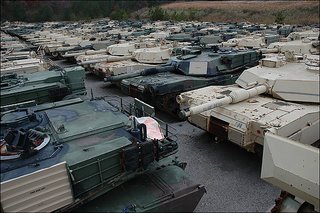
There's one thing that could bring the war in Iraq to a screeching halt - send the American people the bill. Work it all out - direct and indirect costs - sort out how much each should pay and pop the statement in the mail.
One reason George Bush has gotten away with his ill-conceived war so far is that nobody at home has had to sacrifice. No one has had to do without the new boat or SUV or gaming console because of it. There has been no "guns or butter" adjustment. It's all been financed on the "never/never".
A conservative estimate has the cost of the Iraq war to date at roughly $2,000 per man, woman and child in the US. Adding in all direct and indirect costs could boost that to $6,000 or more per capita. For an average family of five that would be $30,000 now due and owing.
The Christian Science Monitor took a look at the situation:
"The US can certainly afford the war, says budget analyst Stan Collender, a managing director of Qorvis Communications in Washington. But the spending is taking resources from other areas, he notes. Because the US is borrowing to finance the war, the cost will be borne by future generations. "And it's still going to be one of the most expensive wars we have ever fought," he says.
"Unlike in previous major wars, the United States has cut taxes at the same time it has increased military spending. "It's fair to say all of the money spent on the war has been borrowed," says Richard Kogan, a senior fellow at the Center on Budget and Policy Priorities, a think tank in Washington. "But eventually everything has to be paid for."
"Numbers are fuzzy on how much has been spent so far on the global war on terror. According to the House Appropriations Committee, some $471 billion has been committed so far. Spratt says it's closer to $507 billion. By the end of this year, on a cash basis, the wars in Iraq and Afghanistan will be closing in on the costs of the Vietnam War ($650 billion in today's dollars) and the Korean War ($691 billion).
"Some analysts believe the cost of the war is much higher than Congress estimates. In a study last January and updated in October, Harvard Prof. Linda Bilmes and Columbia Prof. Joseph Stiglitz estimated the budgetary and economic cost of the war at $2 trillion.
"Ms. Bilmes, in a phone interview, says Congress looks only at its cash outlays, not at the war's future costs. For example, she says, an estimated 42,000 light trucks are in use in Iraq. Although it costs something to run them, the major cost will be replacing them. "That's not factored into the cost of the war," she says.
"The same is true of the cost of taking care of injured veterans in the future. "After our study came out, what surprised us is that the VFW, the Vietnam Vets, and others said, 'Thanks for shining the spotlight on this issue, but your numbers are too low,' " Bilmes says. After working with the vets, she concluded that the future costs of caring for the wounded were much higher than she had estimated."
It is no secret that the US Army is already stretched to the breaking point just to supply enough soldiers to Iraq. What is less often mentioned is that this army is also fast running out of equipment. The photo above shows worn out M1A1 tanks waiting for major overhaul. Much of this equipment is intended to last long enough for a few years of warfare. That calculation doesn't include the destructive effects of Iraq's heat and, more critically, its sandstorms. Sand just keeps getting into moving parts and grinds them down. There is no budget for replacing this incredibly expensive weaponry but, rest assured, the bill for that will be coming soon.
No comments:
Post a Comment